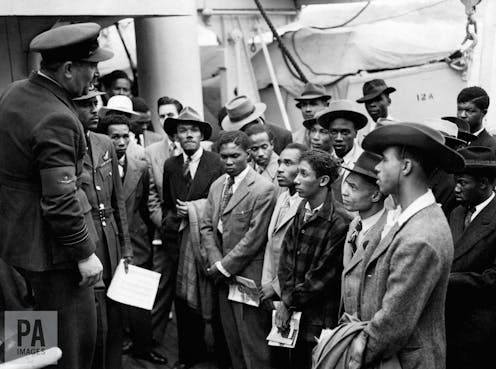Many people from have been told recently that they do not belong in Britain. Some have been detained and faced deportation. But they are no strangers to feelings of unbelonging. These often feature strongly in their stories of early life in Britain.
Most travelled with high expectations of what they regarded as the “mother country”. In interviews for my , one Caribbean woman recalled: “When we were in school we were taught that England was the mother country. It supports its own, it looks after us”.
Another felt loyalty towards England because “It was really the mother country and being away from home wouldn’t be that terrible because you would belong”. Many also had a strong sense of their Britishness. Walter Lother, who came from Jamaica thought of his journey as migration within a common British world.
Many also had a strong sense of their Britishness. Walter Lother, who came from Jamaica thought of his journey as migration within a common British world.

He said: "When I came here I didn’t have a status as a Jamaican. I was British, and going to the mother country was like going from one parish to another. You had no conception of it being different."
came to Britain on the Empire Windrush. For him, being British was crucial to the enterprise.
You could not be good on your own. Your good was no good. Your good had to be British.
Sam King was one of a number of men on the Empire Windrush who were stationed in Britain during World War II. He had served in the RAF.
Most of those who, like King, were demobbed home and then returned to Britain, noticed a change of climate when they arrived back and were no longer wearing uniform. King found people “more aggressive” and “trying to say that you shouldn’t be here”.
Allan Wilmot who served with RAF Sea Rescue describes a similar change. “Being a civilian it was a complete different thing from in the services. ‘What you come back here for? The war’s over’. That was the attitude”.
Most of those who arrived on the Empire Windrush were men, although there was at least one woman stowaway – Averilly Wauchope, a dressmaker from Kingston.
But in the 1950s and 1960s, many women migrated from the Caribbean to Britain independently. They did not come to join husbands but travelled to take up jobs, train as nurses, or search for employment. Others came as children often travelling on their parents’ passports.
Rude awakening
On arrival, sometimes within hours, the myth of the “mother country” that was held up in the Caribbean was frequently dispelled. Having set out as British subjects, the Windrush generation arrived to find that they were “immigrants” – often regarded as dark strangers who did not belong in Britain.
Many of the Windrush generation comment on British ignorance of the empire by comparison with what they knew of Britain. White Britons who were ignorant about the British empire did not know or acknowledge that Caribbean migrants were also British, with a long history that connected them with Britain. Constance Nembhard recalled:
We grew up under the colonial system and we knew everything about England – everything. And we came here, nobody had ever heard of Jamaica. I mean few, few, people. And it was funny, the few who had heard of Jamaica treated you differently. Those who had never heard, they all had the opinion that we lived in trees.
Black people were seen as belonging in the British empire, not in Britain. Caribbean and other migration from the Commonwealth was widely seen as bringing an alien “colour problem” into Britain.
As a BBC television programme in 1955 put it: “Not for the first time in our history we have a colonial problem on our hands. But it’s a colonial problem with a difference. Instead of being thousands of miles away and worrying other people, it’s right here, on the spot, worrying us.”
A characteristic opposition between Britishness as white and “immigrants” as “coloured” underpinned the idea of a “colour problem”. As one woman who migrated from British Guiana recalls: "When we came here we swore we were English because Guyana was British Guiana.
"We were brought up under the colonial rule. If you don’t have a new uniform to go and sing ‘God Save the King’, you hurt. When you come here, you discovered it’s a different thing. If you’re English, you have to be white."
Those who came on the Windrush and their children experienced racism and fought against it.
It took decades but many felt that by the new millennium, their efforts and those of others had secured some progress.
But the Home Office . The decision to restrict the rights of Windrush generation arrivals and their children, and to threaten them with deportation reverses any progress made. It ranks among the most shameful episodes in Commonwealth history. Wendy Webster receives funding from the Arts and Humanities Research Council
Wendy Webster receives funding from the Arts and Humanities Research Council









